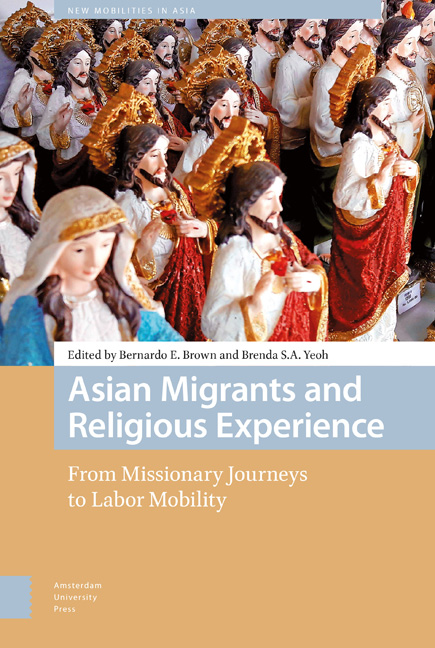Book contents
- Frontmatter
- Contents
- List of Illustrations
- Acknowledgments
- 1 Introduction: Human Mobility as Engine of Religious Change
- Section 1 Mobile Religious Practices
- 2 Saving Yogis: Spiritual Nationalism and the Proselytizing Missions of Global Yoga
- 3 Renewed Flows of Ritual Knowledge and Ritual Affect within Transnational Networks: A Case Study of Three Ritual Events of the Xinghua (Henghua) Communities in Singapore
- 4 Liberalizing the Boundaries: Reconfiguration of Religious Beliefs and Practice amongst Sri Lankan Immigrants in Australia
- Section 2 Transnational Proselytizing
- 5 From Structural Separation to Religious Incorporation: A Case Study of a Transnational Buddhist Group in Shanghai, China
- 6 “10/40 Window”: Naga Missionaries as Spiritual Migrants and the Asian Experience
- 7 Religion, Masculinity, and Transnational Mobility: Migrant Catholic Men and the Politics of Evangelization
- 8 Helping the Wounded as Religious Experience: The Free Burma Rangers in Karen State, Myanmar
- Section 3 Refashioning Religiosity in the Diaspora
- 9 A Multicultural Church: Notes on Sri Lankan Transnational Workers and the Migrant Chaplaincy in Italy
- 10 “Bahala Na Ang Diyos”: The Paradox of Empowerment among Filipino Catholic Migrants in South Korea
- 11 Feeling Hindu: The Devotional Sivaist Esthetic Matrix and the Creation of a Diasporic Hinduism in North Sumatra
- 12 Afterword: What Makes Asian Migrants’ Religious Experience Asian?
- References
- Index
9 - A Multicultural Church: Notes on Sri Lankan Transnational Workers and the Migrant Chaplaincy in Italy
Published online by Cambridge University Press: 12 December 2020
- Frontmatter
- Contents
- List of Illustrations
- Acknowledgments
- 1 Introduction: Human Mobility as Engine of Religious Change
- Section 1 Mobile Religious Practices
- 2 Saving Yogis: Spiritual Nationalism and the Proselytizing Missions of Global Yoga
- 3 Renewed Flows of Ritual Knowledge and Ritual Affect within Transnational Networks: A Case Study of Three Ritual Events of the Xinghua (Henghua) Communities in Singapore
- 4 Liberalizing the Boundaries: Reconfiguration of Religious Beliefs and Practice amongst Sri Lankan Immigrants in Australia
- Section 2 Transnational Proselytizing
- 5 From Structural Separation to Religious Incorporation: A Case Study of a Transnational Buddhist Group in Shanghai, China
- 6 “10/40 Window”: Naga Missionaries as Spiritual Migrants and the Asian Experience
- 7 Religion, Masculinity, and Transnational Mobility: Migrant Catholic Men and the Politics of Evangelization
- 8 Helping the Wounded as Religious Experience: The Free Burma Rangers in Karen State, Myanmar
- Section 3 Refashioning Religiosity in the Diaspora
- 9 A Multicultural Church: Notes on Sri Lankan Transnational Workers and the Migrant Chaplaincy in Italy
- 10 “Bahala Na Ang Diyos”: The Paradox of Empowerment among Filipino Catholic Migrants in South Korea
- 11 Feeling Hindu: The Devotional Sivaist Esthetic Matrix and the Creation of a Diasporic Hinduism in North Sumatra
- 12 Afterword: What Makes Asian Migrants’ Religious Experience Asian?
- References
- Index
Summary
Abstract
With the inflow of five million migrants to Italy, the Catholic Church makes special efforts to attend to the pastoral and cultural needs of Christian transnational workers. Ethnic chaplaincies celebrate mass in a variety of languages and encourage migrants to replicate national traditions, festivities, and devotions. While this approach shows a sensibility toward migrant communities and the challenges that they face when trying to observe Asian forms of religiosity far away from home, it also labels these rituals and traditions as cultural practices that are clearly distinct from the orthodoxy determined by European Catholicism. Sri Lankan priests note that although churchgoers value their dedicated pastoral efforts, Italian clergy often marginalize them and treat them as foreign labor. A profound contradiction emerges when migrant clergy attempt to revitalize parish life in Italy but are restrained by local Church authorities who claim to be protecting European Catholic traditions.
Keywords: reverse mission, multiculturalism, vocation crisis, global Catholicism
Introduction
Over the last century, the demographics of the Catholic Church have shifted toward the southern hemisphere where currently 70 percent of Catholics live. More broadly, Christianity has become a world religion of the non-West, as its regional balance continues to shift away from Europe where the shareof Christianity has dropped from 66 percent to only 25 percent in less than 100 years. But the movement of Christianity to the South also needs to be situated in the context of a massive population flow of migrant labor that travels in the opposite direction, bringing millions of Latin American, Asian, and African migrants to Europe and North America (Jenkins 2006; Sanneh 2008). Taken together, these two transformations are dramatically changing the linguistic and ethnic landscapes of national churches in western Europe and the United States, prompting Christian denominations – especially those responsible for the global expansion of Christianity in the last two centuries – to seriously think about the changing shape of their clergy and flock, and take actions that reflect the super-diversity (Vertovec 2007) of their congregations.
The decline in religious participation that had been predicted by secularization theories of the twentieth century only accurately foresaw the growing religious apathy observed amongst western Europeans (Berger 1999; Casanova 1994; Taylor 2007).
- Type
- Chapter
- Information
- Asian Migrants and Religious ExperienceFrom Missionary Journeys to Labor Mobility, pp. 221 - 242Publisher: Amsterdam University PressPrint publication year: 2018



